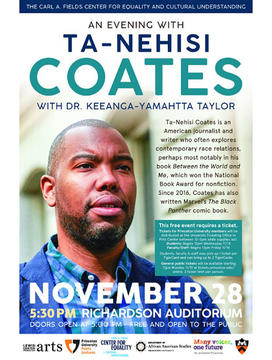Coates Discusses Activism, Writing, and Woodrow Wilson in Campus Talk
Ta-Nehisi Coates, the journalist and author of the award-winning memoir Between the World and Me, believes in maintaining a distance from social activism. In a public conversation Nov. 28 with assistant professor Keeanga-Yamahtta Taylor, Coates spoke about his career and role as a writer — one distinct from an activist.

Coates, whose father was a former Black Panther, left Howard University in his fifth year to write for the Washington City Paper. As a writer for The Atlantic for a decade, he covered politics and culture, particularly about African Americans. The recipient of both the National Book Award for nonfiction and a MacArthur Foundation “genius” grant in 2015, he’s also written a series of Black Panther comics. Coates has been described by The New York Times as one of the country’s most influential intellectuals and writers.
Asked about the difference between writing and public advocacy, Coates said the purpose of journalism is seldom to galvanize or rally individuals. “With writing, you never know who will read,” he said. “You’re never guaranteed an audience.”
Coates was critical of the University’s recognition of Woodrow Wilson 1879 after one student asked Coates how to reckon with the racism in Princeton’s history and for advice on student efforts to address it. “It is an embarrassment to have an institution of higher education named after a white supremacist in his time,” Coates said. “It is to the University’s great discredit and to its great shame that it would in any way honor Woodrow Wilson.”
In response to Taylor’s comment that he rarely references the Black Lives Matter movement, Coates responded that he felt many other African American writers were contextualizing the movement well. Though he supports the movement’s mission, he believes that keeping a degree of separation in his own writing is emblematic of that respect.
“For me as a writer, that distance is really important,” Coates said. While saying that social movements are “essential,” he added: “I think I’m better off as a writer.”









No responses yet